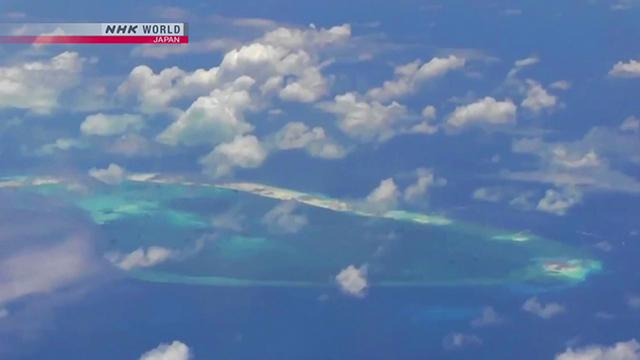China has been asserting control in disputed areas, using force. A series of clashes has erupted.
Beijing has set up what it calls a maritime boundary marker, or the "nine-dash line." The country claims the area inside the marker, citing its "historic rights."
Chinese workers have begun reclamation in the Spratly Islands, constructing 7 artificial islands. Their radars and runways can handle military aircraft.
China has also installed a surface-to-air missile system elsewhere in the South China Sea.
"These Islands in the South China Sea have been Chinese territories for a long time. The Chinese government has the responsibility of protecting its sovereignty and maritime rights."
Xi Jinping / Chinese President
Frustrated Philippines officials have looked to the law to challenge China. The officials told the tribunal the "nine-dash line" is groundless under international law.
They also said the artificial islands were originally rocks and low-tide elevations. The UN Convention on the Law of the Sea does not recognize exclusive economic zones or other maritime rights around such features.
Manila's latest protest was sparked in 2012, when Chinese ships took control of the Scarborough Shoal from the Philippines.
The waters have been a precious fishing ground for generations of Filipino fishermen. But Chinese surveillance vessels constantly patrolling the area have made it difficult for them to do their jobs.
"Chinese crewmen shouted at me to get away. Then their vessel rammed my boat several times until there was a hole in it. It was frightening."
Junmar Pumicpic / Fisherman
The Philippines hopes stronger defense ties with the United States can help it take on China.
The US has been sending naval vessels to waters near some of the artificial islands. The partners are aiming to step up their joint patrols in the disputed waters.
Washington is applying additional pressure on China so it will abide by the tribunal and put the brakes on its maritime activities. But China has refused, stressing territorial disputes should be resolved by the concerned countries, rather than a third party.
"The only position we've taken is let's not resolve this by unilateral action, let's resolve this by rule of law."
John Kerry / US Secretary of State
The first ruling by an international arbitration tribunal has put the ball back in the Chinese court. The next move belongs to Beijing.
